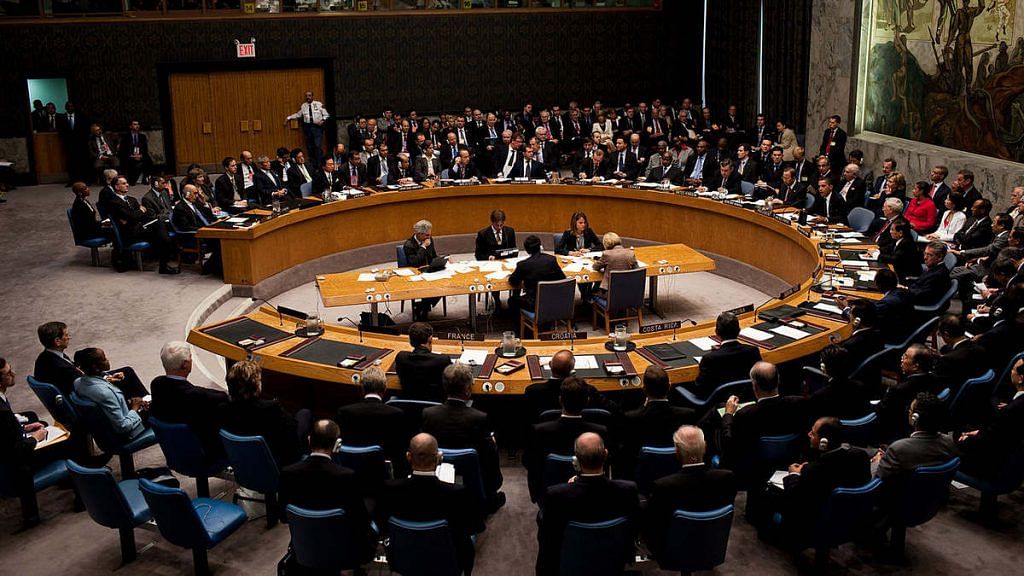New Delhi: India Friday officially began its two-year term as a non-permanent member of the United Nations Security Council along with Norway, Mexico, Ireland and Kenya.
On 17 June, India was elected to the UN Security Council with 184 of the total 192 votes. A member country needs a two-third majority of votes in the General Assembly to become a non-permanent member. This is the eighth time India has been elected as a non-permanent member.
India had last assumed the role of a non-permanent member at the UNSC in 2011-12. Prior to that, it was a non-permanent member for 1950-51, 1967-68, 1972-73, 1977-78, 1984-85 and 1991-92.
In August, India will serve as the president of the council, a position held by each of the members in turn for one month, according to the alphabetical order of the member states’ names. Presidency entails presiding over council meetings, coordinating actions, deciding the content of UNSC debates and more.
In June, External Affairs Minister S. Jaishankar had said that India’s main priority during its membership will be counter-terrorism.
India will strive to achieve a “concrete and result-oriented action at the security council for an effective response to international terrorism,” said Jaishankar.
India is also expected to call for more transparency in listing and delisting of entities and individuals by the UN sanction committees. Getting permanent membership in an expanded council is also high up on the agenda.
As India begins its two-year term, ThePrint looks at the UNSC and its responsibilities.
Also read: Why India wants UN to stop being ‘selective’ with Abrahamic religions, not take sides
UNSC membership, resolution procedures
The Security Council is one of the UN’s six main organs, and is aimed at maintaining international peace and security. It held its first session on 17 January 1946 in Westminster, London.
The UNSC has 15 member and five of them — US, UK, Russia, China and France — are permanent members, who have veto rights. The ten elected or non-permanent members have a tenure of two years. At present, the non-permanent members are Estonia, India, Ireland, Kenya, Mexico, Niger, Norway, Saint Vincent and the Grenadines, Tunisia and Vietnam.
Non-permanent members of the Security Council, however, do not have veto rights. This, in the eyes of several observers, makes them a toothless grouping because they cannot assert their will on any matter of international concern, merely persuade or dissuade other member states from acting in a certain way.
The council responds to crises around the world on a case-by-case basis and takes action based on options that do not involve armed force. For instance, economic and trade sanctions, arms embargoes, travel bans and financial or commodity restrictions.
However, Chapter VII of the UN charter allows the council to authorise the use of force “to maintain or restore international peace and security”.
A peace operation by the council is first adopted with a resolution. Each member of the Security Council has one vote. On issues of procedure (pertaining to the workings of the council), a resolution requires the assent of at least nine members. On substantive matters (that have major political consequences), a resolution requires the assent of nine members, including the concurring votes of the permanent members.
However, any member must abstain from voting if they are involved in the dispute.
Also read: 2 Indians among UN campaign featuring women in peacekeeping, special missions
Responsibilities, criticism of UN Security Council
The UNSC brokers peace by helping parties reach an agreement through mediation, appointing special envoys, dispatching a UN Mission or requesting the UN Secretary-General to settle the dispute. It can also vote to extend, amend or end mission mandates.
The Security Council oversees the work of UN peace operations through periodic reports from the Secretary-General and council sessions. It alone can make decisions regarding these operations, which Member States are obligated to enforce.
However, the council has been criticised for losing relevance and credibility.
Last month, External Affairs Minister S. Jaishankar accused the UNSC of “narrow” leadership. He said it required better representation and needed to push the “refresh button”.
The council’s lack of multilateralism has also been criticised in the wake of the Syrian war crisis and the ongoing Covid-19 pandemic.
Also read: Nehru going to UN on Kashmir was an error. And he knew it
